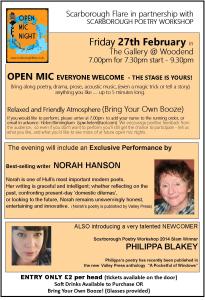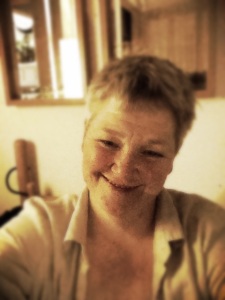Gina Barnett advises a speaker during TED2014. Below, her best last-minute
public speaking tips.:
Start drinking water 15 minutes before you start talking. If you tend to get dry mouth — that scratchy feeling where it’s hard to swallow — start drinking water 15 minutes before you go onstage. Why? Because the microphone will pick up that sticky, clicky sound. “When you close your mouth, don’t let your tongue hit the roof of your mouth,” Barnett offers as a pro tip to avoid popping audio. “Imagine a half a plum on your tongue, which will keep a vacuum from forming.”
.
Psych yourself up, not out. Barnett warns that negative self-talk can become a self-fulfilling prophecy. So don’t stand backstage thinking, “What if I mess up?” Think more like an athlete before a big game, she says. Psych yourself up with phrases like, “I’m so excited!” “It’ll be great!” “I can’t wait to share this idea!” Basically, whatever key phrase makes you feel happy. “Even just thinking the word ‘YES!’ over and over — feel how the thought enters your body and boosts your confidence,” she says.
.
Use your body’s nervous energy for good. Don’t try to contain all your nervous energy.
Let it move through you and energize you for your talk. Do isometrics while you waiting backstage if it helps. Shake your hands out. Barnett remembers one TED speaker who found a private corner backstage to put on headphones and dance — and that speaker walked onstage feeling like a rockstar. And, if nothing else, always remember TED star Amy Cuddy and how to power pose.
.
Focus on your breath when you feel the adrenaline. What should you do if you feel the panic of nerves? “Breeeeeathe,” says Barnett, extending the sound. “Weʼre often not aware of how shallow our breath becomes when weʼre nervous or stressed.” The exercise Barnett recommends: “Take three or four conscious, evenly-paced, smooth
inhalations and exhalations. Let the belly go and let the breath go all the way
down into your abdomen. This can center your energy and focus your thoughts.”
.
Beware of repetitive motion. On stage, people often deal with adrenaline by unconsciously swaying or shifting their weight from foot to foot. This is not good. “Repetitive movements are distracting and set up a lullaby pattern in the audience’s brain,” says Barnett. The best way to make sure you aren’t doing this? Rehearse in front of people, who can point it out to you. And also rehearse out loud in front of a mirror to self-diagnose.
.
Think about how to use movement wisely. “You can walk,” says Barnett, “but not pace. You can step forward and or back, but not rock.” These are just as bad as swaying — they create that lull. Barnett has a great tip for how to make sure that you move in a way that adds to your talk rather than detracts from it. “Practice moving to
make a new point,” she says. “Try coming closer to the audience when the content of your talk calls for it.” One technique she likes for this — rehearse while standing on newspapers spread out on the floor. You’ll be able to hear your movement as the paper crunches so you can really move “with intention and purpose.”
.
Use your tone to strengthen your words. Merge your tone with the topic of your speech, says Barnett. Don’t deliver great news in a monotone voice or serious news too excitedly, as disjunctions like that will distract the audience. Barnett recommends going through your script and tagging what each piece of news means. By doing that, you can focus on how your tone can strengthen the message, rather than undermine what you are trying to get across.
.
Give people a chance to adjust to your accent. Everyone has an accent — at least, when someone else is listening. Luckily, TED has a global audience and is very comfortable with hearing different varieties of speech. That said, speakers can make their accents more accessible to listeners all over the world. Barnett’s advice: keep your opening sentences slow and over-enunciated, so the audience can adapt to the way you speak. “Our ears are trained to adjust to accents,” says Barnett.
.
Focus on something outside of yourself. Barnett has a favorite exercise for someone who is just about to go onstage: she calls it “focusing out.” She explains: “Pick anything — like the color green — and look all around you to see where you spot it in the room. Or pick an object to observe. Notice what shoes people are wearing, or whoʼs wearing a watch. Or try paying attention to how light reflects off surfaces.”
Doing something like this will shift the focus from what’s going on in your body and find to something outside. It can definitely help you relax.
.
Remember that the audience likes you. As Barnett says, “The TED audience — as big, scary and remote as they may seem — is totally on your side. They want you to have a good time up there, they want to hear your ideas, even if they don’t agree with
them, and they want you to succeed.” Enough said.
And finally, no matter how well you prepare — be okay with the unexpected. You may forget a word; someone may drop something backstage; there might be a technical difficulty. Take a moment, breathe deeply and just roll with it. As one TED speaker laughed today as her slides spiraled out of order in rehearsal: “It’s just about having fun, right?”


